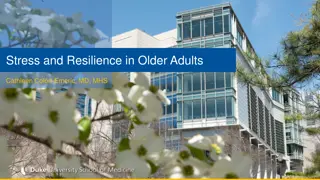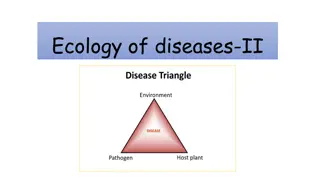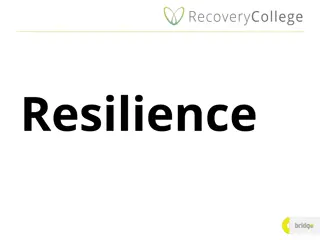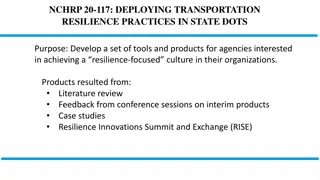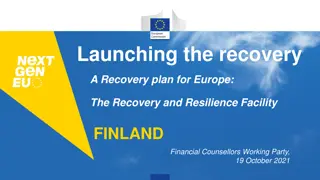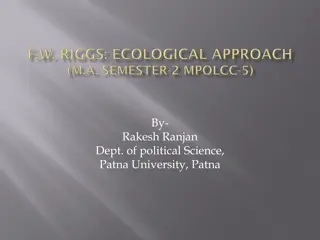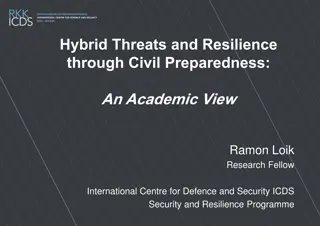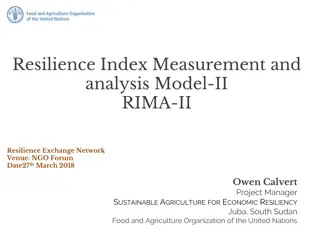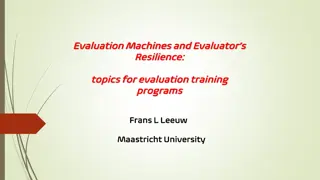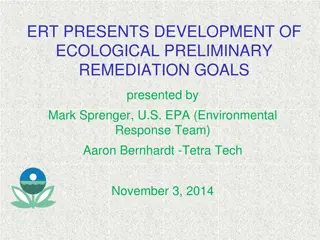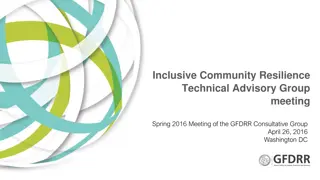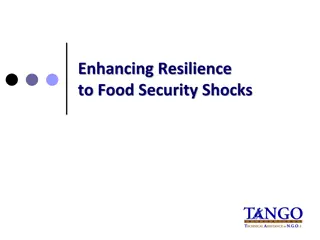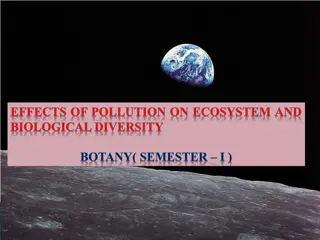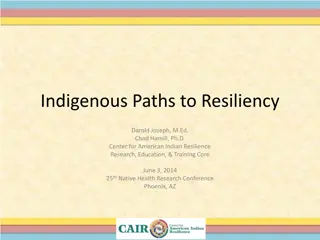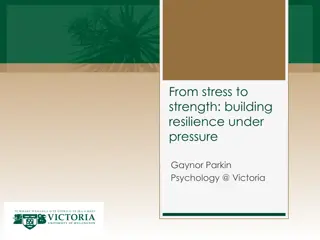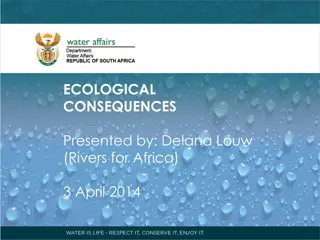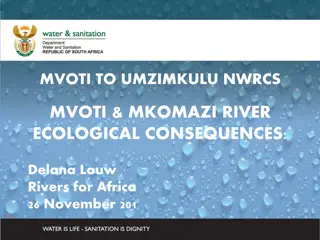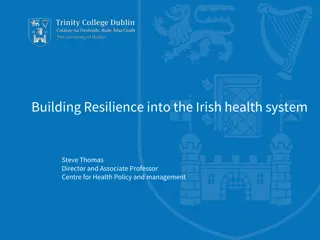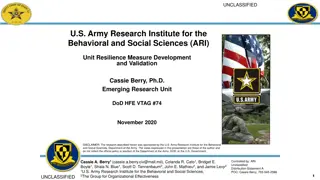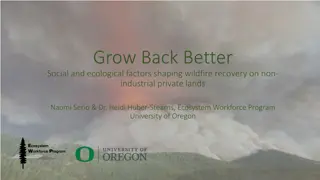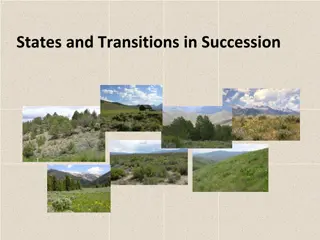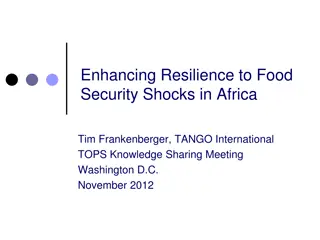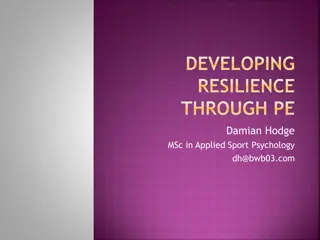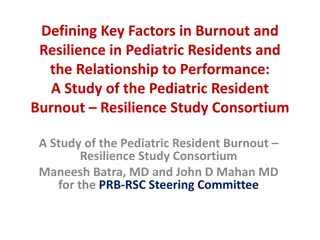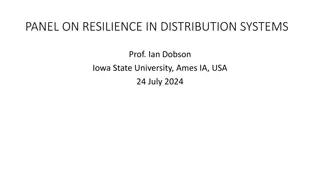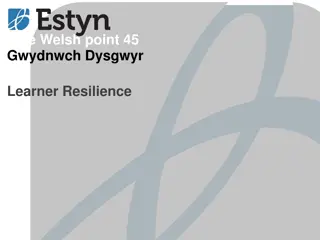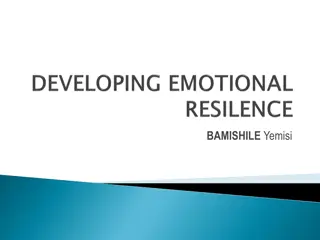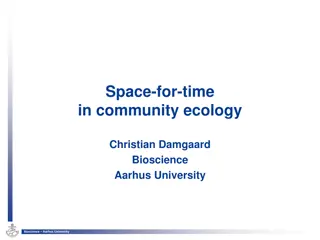Enhancing Educational Resilience with RESTA Model
RESTA is an evidence-based intervention model designed to boost Educational Resilience in young individuals by involving educational staff. It differs from other support models by incorporating insights from educational resilience and trauma-responsive practices. Two underpinning models and RESTA pr
0 views • 12 slides
Enhancing Urban Resilience in BRICS through Integrated Infrastructure and Sustainable Development
Dr. George Tsibani discusses the importance of water resilience, sustainable development goals, and the role of BRICS in fostering smart cities and rural-urban integration. The focus is on building resilience in urban water systems for economic growth and societal well-being. Solutions are proposed
1 views • 14 slides
Cummins Supply Chain Resilience Session Overview
Explore how Cummins has invested in supply chain resilience after a major flood in 2008, including partnering with Horizonscan for a Supplier Resilience Program. Discover insights into their approach, benefits to suppliers, and the importance of supplier resilience. Follow their journey and internal
1 views • 10 slides
Understanding Stress and Resilience in Older Adults
Explore the complex interplay between stress and resilience in older adults, examining models of physical and neurological resilience, recovery trajectories after hip fracture, and dynamic indicators of resilience. Considerations include psychosocial resilience factors like external support, social
0 views • 19 slides
Overview of Ecological Studies in Epidemiology
Ecological studies in epidemiology involve studying groups of individuals at a population level to examine the correlation between exposure and disease occurrence. While cost-effective and useful for generating hypotheses, ecological studies have limitations, such as the inability to control for con
3 views • 21 slides
Building Resilience and Dealing with Stress: A University Guide
Explore the concept of resilience, signs of stress, and practical strategies to manage stress while navigating university life. Reflect on challenges, create supportive connections, and improve personal resilience through actionable plans. Remember, resilience is about bouncing back, working through
0 views • 12 slides
Understanding Ecosystems and Disease Ecology
Explore the diverse types of ecosystems, including autochthonous, anthropurgic, and synanthropic ecosystems, and their impact on disease ecology. Learn about biotopes, biocenosis, ecological mosaics, and ecological interfaces, and discover how infectious diseases can be transmitted across these inte
0 views • 10 slides
Building Resilience: A Guide for Families
Explore examples of adversity and the importance of resilience. Learn what resilience is, how it can be developed, and why it matters. Discover ways parents and caregivers can assist children in building resilience through practical strategies. Myth versus reality around resilience is debunked, emph
0 views • 15 slides
Disaster Resilience Strategy in Developing Countries Vulnerable to Natural Disasters
The IMF's policy paper highlights key challenges faced by small states in building resilience, such as under-investment and donor support post-disaster rather than pre-disaster. The Disaster Resilience Strategy (DRS) emphasizes three pillars for intervention: post-disaster resilience, financial resi
0 views • 11 slides
Understanding Resilience: Coping and Thriving in Challenging Times
Resilience is the key to maintaining well-being in difficult situations, helping us cope with life's challenges and adapt to adversity. It plays a crucial role in protecting mental health and can be developed by anyone regardless of personal history. Learn about risk and protective factors, reflect
0 views • 16 slides
Deploying Transportation Resilience Practices: Tools and Insights
Develop tools for fostering a resilience-focused culture in state DOTs through literature review, case studies, and feedback. Explore various definitions of resilience, including organizational perspective, and key observations from the Transportation Resilience Innovations Summit. Emphasize the imp
0 views • 32 slides
Finland's Recovery and Resilience Plan for Europe: Overview of Key Initiatives
Finland's Recovery and Resilience Plan focuses on addressing challenges identified in CSR reports through a balanced response that promotes growth, resilience, and social impact. Key areas include green and digital transitions, resilience in health and social care, competitiveness and growth, and ed
0 views • 10 slides
The Ecological Approach in Comparative Public Administration
Fred W. Riggs, a proponent of the Ecological Approach in Public Administration, emphasized the importance of understanding the interaction between administrative systems and their external surroundings. He introduced the Fused-Prismatic-Diffracted Model to explore the unique contexts of developing c
0 views • 21 slides
Understanding Hybrid Threats and Resilience through Civil Preparedness
Exploring the concept of hybrid threats that combine external threats and internal vulnerabilities, this academic viewpoint by Ramon Loik emphasizes the importance of civil preparedness in building resilience against crises. It delves into aspects such as target selection, active influencing, and th
0 views • 11 slides
Understanding the RIMA-II Model for Resilience Measurement in Agricultural Development
The RIMA-II model offers an innovative quantitative approach to measuring resilience in the context of food insecurity. It provides a framework for understanding how households cope with shocks and stressors, enabling effective assistance for vulnerable populations to build food secure and resilient
5 views • 18 slides
Understanding the Relationship Between Ecology and Business
Ecology and business have a complex relationship where human activities impact the ecological environment, and in turn, the environment influences our quality of life. Maintaining ecological balance is crucial for sustainable development, and businesses play a significant role in ensuring environmen
0 views • 19 slides
Insights into Building Evaluator Resilience for Effective Evaluation Programs
Explore topics on evaluator resilience, incorporating training insights, and the importance of ethical-behavioral approaches in evaluation. Understand the challenges, paradoxes, and strategies for building resilience to navigate complexities in evaluation practice. Learn from examples of insufficien
0 views • 8 slides
Eco-Remediation Goals Development Training Overview
This presentation by Mark Sprenger from the U.S. EPA discusses the development of Ecological Preliminary Remediation Goals (PRGs). It covers the process steps, assumptions, risk information activities, and resources related to ecological risk assessment within the EPA's programs. The training module
0 views • 53 slides
Inclusive Community Resilience Technical Advisory Group Meeting Spring 2016
Inclusive Community Resilience focuses on channeling resources to communities and households, promoting citizen engagement, community empowerment, gender and social inclusion. The operational approach integrates citizen engagement, gender, and social inclusion into activities, mainstreams Disaster R
0 views • 8 slides
Understanding Resilience in Food Security Shocks
Resilience in the context of food security shocks involves the ability of individuals, households, communities, and systems to bounce back and recover from various stressors. This resilience is crucial in regions facing continuous crises like the Horn of Africa and the Sahel, where factors beyond we
1 views • 21 slides
Understanding Resilience: A Comprehensive Exploration
Resilience is portrayed as a dynamic process rather than an inherent trait, accessible to all individuals. The capacity for resilience can be developed and harnessed through various resources and support systems. This narrative delves deep into the ordinary yet powerful aspects of resilience, emphas
1 views • 13 slides
Understanding Biological Diversity and Ecological Organization
Exploring the intricate balance of flora and fauna on our planet, this content delves into the vast array of plant and animal species coexisting in various ecosystems. It discusses the significance of biodiversity, the interaction of biotic and abiotic components in ecological systems, and the ecolo
0 views • 41 slides
Exploring Indigenous Resilience in Native Communities
This content delves into the concept of resilience within Native American communities, discussing factors that contribute to individual and cultural resilience, as well as examining risk and protective factors. It highlights the importance of cultural identity, spirituality, and positive relationshi
3 views • 11 slides
Building Resilience Through Healthy Habits: Sleep, Nutrition, and Self-Care
Cultivating resilience through impactful habits like prioritizing quality sleep, nourishing food choices, and meaningful breaks for self-care. Understanding the connection between sleep, mental health, immunity, gut health, and overall well-being. Embracing strategies for resilience such as a balanc
0 views • 33 slides
Building Resilience: From Stress to Strength
Psychological resilience allows individuals to bounce back from stress, adversity, and change effectively. This book by Gaynor Parkin delves into what promotes resilience, highlighting the importance of everyday habits and exercises in building resilience. The evidence presented covers the role of p
0 views • 23 slides
Understanding Ecological Consequences in Ecosystem Management
Delana Louw from Rivers for Africa presented on the ecological consequences of various scenarios in ecosystem management. The process involves delineating units of analysis, stakeholder engagement, quantifying ecological water requirements, evaluating scenarios, and determining management classes. B
0 views • 14 slides
Ecological Consequences Assessment for Conservation Areas
Determining the ecological consequences of various scenarios is crucial for conservation efforts. The assessment focuses on changes in geomorphology, physico-chemical properties, fish populations, macroinvertebrates, and riparian vegetation. By evaluating scenarios based on ecological significance,
0 views • 11 slides
Enhancing Resilience in the Irish Health System During Economic Contractions
The Resilience Project conducted at Trinity College Dublin focused on fortifying the Irish health system amidst economic challenges. The project aimed to identify strategies to protect health resources, manage scarcity, pursue reforms, and anticipate future crises. Three key pillars of health system
0 views • 27 slides
Understanding Unit Resilience in the Army: Research Insights
Resilience at the unit level in the Army is essential for sustained performance and readiness. This research project, sponsored by the U.S. Army Research Institute, focuses on measuring and understanding team resilience components and their impact on overcoming stressors. The study aims to validate
0 views • 22 slides
Sustainability Challenges in ET Collaboration: Addressing Ecological and Non-Ecological Aspects
The ET Collaboration is realizing the importance of sustainability, encompassing ecological and non-ecological aspects. Issues include balancing energy consumption and hardware longevity, remote access possibilities, funding sustainability, social partnerships, and designing instruments with sustain
0 views • 5 slides
Exploring Social and Ecological Factors in Wildfire Recovery on Private Lands
This study delves into the social and ecological aspects influencing wildfire recovery on non-industrial private forest lands post the Labor Day fires. Focusing on NIPF landowners, the research aims to understand the factors shaping resilience and recovery at the landscape level, including the role
0 views • 12 slides
Understanding Plant Community Succession and Ecological Transitions
Explore the dynamic process of plant community succession, from pioneer stages to climax communities, and the intricate patterns of transitions in ecological systems. Discover the variability and stability of different states within ecosystems, highlighting the complexities of natural ecological dyn
0 views • 14 slides
Enhancing Resilience to Food Security Shocks in Africa
Enhancing resilience involves anticipating, adapting to, and recovering from hazardous occurrences in a way that protects livelihoods and supports development. Resilience is vital in regions facing continuous crises due to complex interactions of political, economic, social, and environmental factor
0 views • 32 slides
Developing Resilience Through Physical Education: Strategies and Insights by Damian Hodge
Damian Hodge, an experienced Sport Psychology Manager, shares his expertise in developing resilience through PE sessions for children. He emphasizes the importance of resilience, provides insights on children's experiences, and highlights the significance of fostering resilience in overcoming challe
0 views • 25 slides
Pediatric Resident Burnout & Resilience Study Consortium Overview
This study aims to investigate the factors influencing burnout and resilience in pediatric residents, with a focus on enhancing well-being and performance. The Pediatric Resident Burnout Resilience Study Consortium (PRB-RSC) involves over 20 residency programs in the U.S. to examine the epidemiology
0 views • 18 slides
Enhancing Power System Resilience: Insights and Strategies
Explore the critical aspects of power system resilience in distribution systems, focusing on extreme events, asset hardening, fast recovery, and administrative processes. Learn how resilience differs from reliability, robustness, and other concepts, and discover practical strategies to implement res
0 views • 13 slides
Understanding Resilience in Learners: Key Approaches and Factors
Resilience in learners plays a crucial role in academic performance and emotional well-being. It involves the ability to cope with challenges and adversities. Factors such as self-esteem, self-confidence, and positive relationships contribute to enhancing resilience. This report by Estyn explores ef
0 views • 19 slides
Understanding Ecological Goods and Services from Our Oceans
Explore the importance of ecological goods and services provided by oceans in Lesson 2 of the Oceans for Beginners curriculum. Learn about the tangible products, benefits, and services derived from ocean ecosystems, and reflect on their significance. Understand the categories of ecological services
0 views • 15 slides
Enhancing Emotional Resilience: Key Strategies and Benefits
Exploring the concept of emotional resilience, this content covers the definition of emotions, emotional resilience, and the domains of resilience. It delves into the importance of emotional resilience, ways to improve it, and how it helps individuals bounce back from adversity, maintain balance, an
0 views • 17 slides
Understanding Space-for-Time Substitution in Community Ecology
Space-for-time substitution (SFT) is a method used to study slow ecological processes by assuming different sites are at various stages of development. This approach, famous for its role in ecological development, has been critiqued for its implicit use in testing hypotheses on ecological processes
0 views • 7 slides



